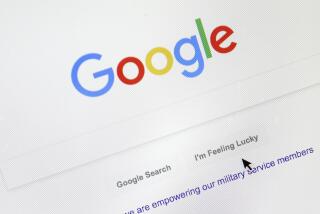As More Government Goes Online, Some See Hazards
- Share via
WASHINGTON — Hoping to save hundreds of millions of dollars in administrative costs, public agencies from city halls to the military are racing to make delivery of government services just a mouse click away.
In January, Virginia began offering motorists the option of renewing driver’s licenses online. Two months later, the Arizona Democratic Party conducted the nation’s first binding election that accepted votes over the Internet. And in Los Angeles, the city is negotiating with Ezgov.com Inc. to allow car-crazy Californians to pay their parking tickets online and perhaps take care of other levies, such as property taxes.
The Internet “is revolutionizing the way people interact with their government,” said Ed Trimble, founder of Atlanta-based Ezgov. “This empowers citizens to deal with their government online any time, saving hours of paperwork and time spent waiting in line.”
But the advent of e-government may not be the boon consumers expect. Privacy advocates worry that companies hired to do the government’s work may use confidential information to assemble consumer profiles for sale to marketers. Consumer protection groups fear that cities looking to the Internet for cost savings will not pass them along to citizens. And then there is the question of service.
Electronic Queries Could Burden Workers
Wary of lumbering bureaucrats whose style is the antithesis of the fast-moving, always-available Internet, some experts worry that e-government actually could worsen public service. Faced with a deluge of e-mail and other electronic inquiries, as well as the ongoing responsibility of answering phones and handling paperwork at their mortar-and-brick offices, government workers could be overwhelmed, making service worse.
Kevin Childress is chief financial officer of National Information Consortium Inc., a Kansas company that has contracted with 11 states to provide Internet-based government services such as renewing driver’s licenses and paying income taxes. But he admits being struck by the contrasting level of responsiveness between government and private industry.
“We promise to respond to any e-mail or problem on our network within 24 hours,” Childress said. “But as far as the mail we receive for the government is concerned, we just forward it to the responsible agency. We have no control over how quickly they respond.”
Robert D. Atkinson, director of the Technology and New Economy Project at the Progressive Policy Institute in Washington, also favors e-government but worries about a divide between Internet expectations and government delivery.
“If you are used to trading stocks online or ordering books online and getting them the next day,” it may be unreasonable to expect that kind of speed from “surly clerks” who force citizens to “wait in line to do business with the government,” he said.
Still, many government officials said that private industry Internet go-betweens are lifesavers for small municipalities and agencies strapped for cash or lacking the technology and staffing to set up their own Internet sites.
In Riverside County, Calif., Chief Deputy Treasurer Tom Mullen said that the county tapped the Yahoo portal site to auction off real estate saddled by delinquent taxes. Previous auctions conducted offline attracted mostly local residents. But this sale in February drew $160,000 in bids from as far away as Michigan and Illinois.
“The online auction made a tremendous difference,” Mullen said. “Normally we have to hire sheriff’s deputies” and make other costly arrangements to stage an auction. But online, “we were able to conduct a sale in a much more efficient manner.”
Savings May Not Go to Consumers
Federal agencies dream of big electronic savings. The Internal Revenue Service, for instance, said that it saves $3.48 on every tax form sent to a taxpayer if it uses e-mail. The Army offers potential enlistees the opportunity to chat online with a “cyber recruiter” instead of going to storefront recruiting offices.
But don’t expect savings to be passed along.
Ezgov.com charges $3 per transaction on government services it handles, a charge the company says governments often pass along to citizens. The state of Texas is planning to charge transaction fees for certain government services being offered online to businesses, which could bring the state millions of dollars, starting in July.
“Let’s face it,” the costs are higher, said Carolyn Purcell, executive director of the Texas Department of Information Services. “We can’t discontinue other service channels in favor of offering services only over the Internet.”
If cost savings can be a casualty of government’s foray into cyberspace, so too can citizen privacy. Increasingly, government--which has had a checkered record of turning certain public functions over to private companies, including the operation of penal institutions--is being enticed to use citizen information for profit.
Privacy groups and even some industry officials are particularly troubled by public agencies farming out government services to for-profit Internet firms with independent Web sites. Computers maintained by these companies are stockpiling data created by the government, such as Social Security numbers, political party preferences, health care records and welfare benefits. Most of these records are held on secure computers, but worries remain.
“There are a ton of dot-coms loaded with venture capital going after this business . . . but, as a government official, you don’t want to throw the baby out with the bath water. You want to protect your brand . . . and your data,” said Janet Caldow, director of IBM’s Institute of Electronic Government, a Washington think tank.
“If the government gives that away, [it has] lost an opportunity” to forge a better relationship with the citizens it serves, Caldow said.
State governments have taken a variety of approaches to their New Age encounters with cyberspace.
In Arizona, the site of the nation’s first election, a primary, in which ballots were accepted over the Internet, the Arizona Democratic Party hired New York-based Election.com to run its operation.
Democratic Party officials declined in a February court hearing to disclose the contract, saying that the election was not paid for by public funds.
But Deborah M. Phillips, president of Voting Integrity Project, which is pursuing a federal lawsuit to uncover details of the contract, said that the refusal sets a dangerous precedent. Without public scrutiny, she said, citizens cannot assess the competence, financial influences or even the ownership of online companies hired to carry out critical government functions like voting.
By contrast, the state of Washington has gone in-house to set up perhaps one of the most ambitious government presences in cyberspace.
Relying mostly on its own employees, the state maintains a colorful and informative Web site that rivals that of many commercial portals, such as Yahoo and Excite.
The Web site, https://www.access.wa.gov/, is updated daily and draws more than 1 million different visitors a month, said Steve Kolodney, director of the Department of Information Services there. It features everything from state lottery results and job opportunities to criminal histories on individuals and even homework help for students.
“Our portal page is aimed at engaging people in government,” said Kolodney. “If you don’t hire your own people and build your own Web presence, you lose core competence and you become more distant from the needs and desires of your citizens [as well as lose] control of the information you are entrusted with and accountable for.”
Concerned about triggering a public furor over transaction fees and other commercial online trappings but reluctant to use state workers to put government services on the Internet, 11 states have taken a compromise route.
They have turned to Kansas-based NIC, which provides a more sober, noncommercial cyberspace environment in exchange for states granting the company permission to sell government data to insurance companies, employers, lobbyists and other third parties.
But financing Web sites by the sale of public data, rather than through transaction fees, can be as problematic as crass commercialism.
The state of South Carolina, for instance, just ended an unsuccessful six-year legal battle to obtain the right to sell driver’s license information to individuals and private companies. The practice had earned states such as Wisconsin as much as $8 million in annual revenue, according to the U.S. Justice Department.
“There is a huge privacy conflict in the handling of information by state and local agencies,” said David Sobel, general counsel for the Electronic Privacy Information Center in Washington, which filed a friend-of-the-court brief in the South Carolina case. “This is an issue that policymakers need to address.”
Much of the information collected by federal, state and local governments and posted online is, of course, freely available offline, although some citizens raise eyebrows at what is cropping up in cyberspace.
Fairfax County, Va., for instance, offers a surprising peek into its citizens’ homes by letting anyone with an Internet connection learn how many bedrooms, bathrooms and other property details exist at county residences.
Critics say that placing such information online soon will make it nearly impossible to maintain personal privacy from marketers eager to compile electronic dossiers on individuals.
But government officials say that, if data is available offline, they have an obligation to make it available on the Internet.
California Secretary of State Bill Jones, who has led the state’s efforts to develop a one-stop Web site where state residents would have access to 90% of government services by 2002, also generally supports putting more government information, not less, on the Internet.
Taxpayers, he said, should be “online, not in line.”






